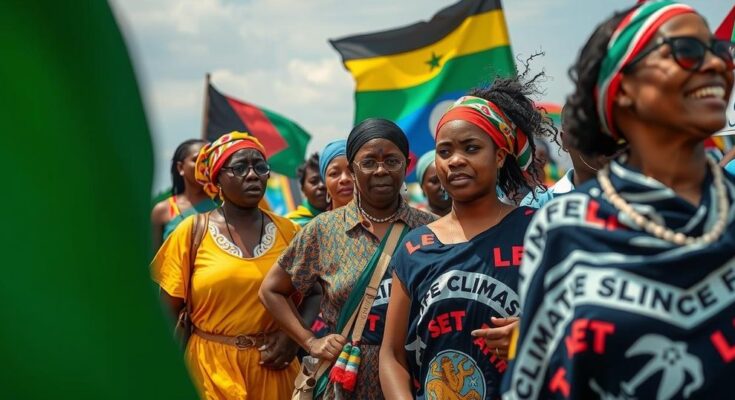Senegalese women marched in Dakar demanding climate justice, urging polluting countries to reduce greenhouse gas emissions ahead of COP29. The demonstration, a response to recent devastating floods, highlighted the need for accountability from major emitters and emphasized the disproportionate impact of climate change on Africa, which contributes only 3.8% of global emissions.
On Saturday, approximately 50 women activists in Dakar, Senegal, came together to participate in a march advocating for climate justice, emphasizing the need for major polluting nations to reduce their greenhouse gas emissions ahead of the upcoming COP29 summit scheduled for November 11. This annual event, held since 2021, took on heightened significance due to escalating environmental challenges faced by the nation. The demonstrators chanted slogans like “Down with capitalism! Down with polluting countries!” while carrying banners that called for sustainable management of Senegal’s natural resources and a commitment to a decarbonized future. The urgency of their message was underscored by recent devastating floods affecting Senegal, which left thousands of residents displaced and severely impacted agricultural land, with over 1,000 hectares affected. Activists contended that nations responsible for substantial greenhouse gas emissions owe reparations to African countries for the adverse effects of climate change. Data from the Carbon Disclosure Project indicates that Africa contributes only 3.8% of global emissions, amplifying claims for justice from the global north. Khady Camara, a prominent organizer of this year’s event, articulated the call for adherence to the Paris Agreement, urging global leaders to fulfill their commitments. Fellow activist Khady Faye expressed deep concerns regarding environmental degradation in her coastal region, particularly the coastal erosion exacerbated by nearby oil drilling activities at the Sangomar oil fields. She implored stakeholders to reconsider such ventures, stressing the need to preserve local communities and their environments, stating, “Think about the suffering of these communities, think about the suffering of these women.”
The challenges of climate change have disproportionately impacted developing nations, particularly in Africa, where women often bear the brunt of environmental degradation and its related consequences. In Senegal, the experience of severe floods has heightened awareness of the need for climate justice. Recent statistics reveal that while Africa contributes minimally to global emissions, its countries face the dire results of environmental policies set by more industrialized nations. The annual climate marches undertaken by Senegalese women symbolize a grassroots movement demanding accountability and a shift to sustainable practices.
In summary, the march held by Senegalese women activists highlighted the urgent call for climate justice as they urged major polluting countries to take responsibility for their actions in light of climate change. With the backdrop of severe flooding and environmental challenges in Senegal, the message for accountability and adherence to international climate agreements resonates strongly. Their advocacy not only seeks reparations but also a more sustainable future for vulnerable communities.
Original Source: abcnews.go.com




